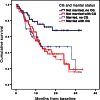Associations between advanced cancer patients' survival and family caregiver presence and burden
- PMID: 26860217
- PMCID: PMC4864814
- DOI: 10.1002/cam4.653
Associations between advanced cancer patients' survival and family caregiver presence and burden
Abstract
We conducted a randomized controlled trial (RCT) of an early palliative care intervention (ENABLE: Educate, Nurture, Advise, Before Life Ends) for persons with advanced cancer and their family caregivers. Not all patient participants had a caregiver coparticipant; hence, we explored whether there were relationships between patient survival, having an enrolled caregiver, and caregiver outcomes prior to death. One hundred and twenty-three patient-caregiver dyads and 84 patients without a caregiver coparticipant participated in the ENABLE early versus delayed (12 weeks later) RCT. We collected caregiver quality-of-life (QOL), depression, and burden (objective, stress, and demand) measures every 6 weeks for 24 weeks and every 3 months thereafter until the patient's death or study completion. We conducted survival analyses using log-rank and Cox proportional hazards models. Patients with a caregiver coparticipant had significantly shorter survival (Wald = 4.31, HR = 1.52, CI: 1.02-2.25, P = 0.04). After including caregiver status, marital status (married/unmarried), their interaction, and relevant covariates, caregiver status (Wald = 6.25, HR = 2.62, CI: 1.23-5.59, P = 0.01), being married (Wald = 8.79, HR = 2.92, CI: 1.44-5.91, P = 0.003), and their interaction (Wald = 5.18, HR = 0.35, CI: 0.14-0.87, P = 0.02) were significant predictors of lower patient survival. Lower survival in patients with a caregiver was significantly related to higher caregiver demand burden (Wald = 4.87, CI: 1.01-1.20, P = 0.03) but not caregiver QOL, depression, and objective and stress burden. Advanced cancer patients with caregivers enrolled in a clinical trial had lower survival than patients without caregivers; however, this mortality risk was mostly attributable to higher survival by unmarried patients without caregivers. Higher caregiver demand burden was also associated with decreased patient survival.
Keywords: Advanced cancer; family caregivers; patient survival.
© 2016 The Authors. Cancer Medicine published by John Wiley & Sons Ltd.
Figures



References
-
- Dionne‐Odom, J. N. , Azuero A., Lyons K. D., Hull J.G., T. Tosteson, Li Z., et al. 2015. Benefits of Early Versus Delayed Palliative Care to Informal Family Caregivers of Patients With Advanced Cancer: outcomes From the ENABLE III Randomized Controlled Trial. J. Clin. Oncol. 33:1446–1452. - PMC - PubMed
-
- Dunning, T. 2012. Natural experiments in the Social Sciences: a design‐based approach. Cambridge University Press, New York.
-
- Yabroff, K. R. , and Kim Y.. 2009. Time costs associated with informal caregiving for cancer survivors. Cancer 115(18 Suppl):4362–4373. - PubMed
-
- Stenberg, U. , Ruland C. M., and Miaskowski C.. 2010. Review of the literature on the effects of caring for a patient with cancer. Psychooncology 19:1013–1025. - PubMed
Publication types
MeSH terms
Grants and funding
LinkOut - more resources
Full Text Sources
Other Literature Sources
Medical

